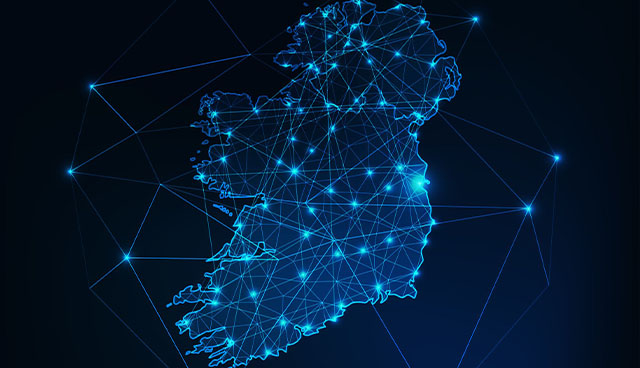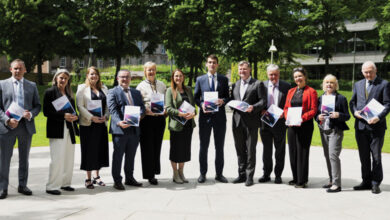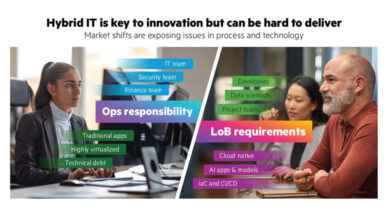Harnessing the digital decade

In February 2022, the Government launched Harnessing Digital: The Digital Ireland Framework, a strategy which seeks to enable digital transition across the economy and society and deliver access to a gigabit network to all premises by 2028 and 5G by 2030.
Ambitious goals are set within the framework, not least the targets regarding the digitalisation of Irish businesses, with the Government aiming for 90 per cent of SMEs to be at basic digital intensity and 75 per cent enterprise take-up in cloud, AI, and big data by 2030. Such initiatives come at a time when Irish businesses are in need of rapid uptake of digitalisation, with ActionPoint’s H2 2021 Digital Transformation Index Report stating that only 10 per cent of 248 Irish SMEs across 18 sectors surveyed are currently classed as digitally strategic or optimised.
The report also found that 37 per cent of the businesses surveyed were classified as digitally reactive, having “somewhat” clear IT priorities and being reactive to IT needs rather than proactive. Only 51 per cent of respondents were found to be using collaboration and communication platforms such as those that facilitate remote working and 41 per cent of respondents “had used analytics to better understand the customer”.
In this context, the Government’s strategy arrives just in time, with a pledge to “help to maximise the well-being of Irish people and their businesses, the length and breath of the country” and to “help us full realise many of the benefits of digital including: more flexible and remote working and new job opportunities; new markets and customers for businesses; more efficient and accessible public services for all; and empowerment and choice in how we learn or participate in social activities”.
The framework is set out across four key themes: digital transformation of business; digital infrastructure; skills; and the digitalisation of public services. These four themes are in line with the four cardinal points of the EU’s Digital Compass. Implementation of the framework will be driven by the Cabinet Committee on Economic Recovery and Investment, which is chaired by the Tánaiste and Minister for Enterprise, Trade and Employment Leo Varadkar TD.
Direct actions on the part of the Government to address the digitalisation of businesses will include the rolling out of an “ambitious awareness-raising campaign to encourage businesses to digitalise” and a new digital portal open to all enterprises with information on supports available. The Government also plans to rollout its new Digital Transition Fund, totalling €85 million, which will run until 2026 as part of the National Recovery and Resilience Plan. The funding will “be used to help companies at all stages of the digital journey” in an effort to “significantly ramp up the level of micro and start-up businesses becoming digital exporters by 2025”. The Government also plans to establish both Ireland’s European Digital Innovation Hubs and a National AI Cluster in 2022 as part of their plans.
Under the theme of digital infrastructure, the Government pledges to deliver “a significant package of measures to strengthen the capacity and footing of the NCSC”, including the expansion of its staff from 25 to 45 in 18 months and 70 within five years. A five-year technology strategy will be developed for the centre that “scopes its internal requirements, and its relationship with academia and industry” and legislation will be developed to establish it on a statutory basis with formal powers and a legal mandate.
For skills, the delivery of high-level digital skills “through more and diverse pathways in higher education and further education and training” are pledged, along with a move to a unified tertiary education system “enabling a broadening of opportunities, seamless pathways and strengthening employability and enterprise engagement”. Support for digital literacy skills is to be delivered through the implementation of a 10-year Adult Literacy for Life Strategy.
“The Digital Ireland Framework will help to maximise the well-being of Irish people and their businesses, the length and breadth of the country.”
Finally, the digitalisation of public services will be powered by the implementation of the Civil Service Renewal 2030 Strategy, the delivery of the first iterations of the new Life Events Portal, the revision and deliverance of a renewed eHealth Strategy by 2030, and the fulfilment of the Government’s commitment under the National Recovery and Resilience Plan to the tune of €291 million.
Speaking upon the launch of the framework, Minister of State with responsibility for Trade Promotion, Digital and Company Regulation Robert Troy TD said: “With the launch of the digital strategy, we are setting ambitious targets for the next phase of digitalisation in Ireland so that we can continue to reap the benefits offered by digital technologies. Preparing for tomorrow’s economy and society means seizing the opportunities presented by digital technologies and will enable us to chart a course of recovery that is open, collaborative and responsive to new developments on the horizon.”
|
Seven targets are outlined by the Government:
|





